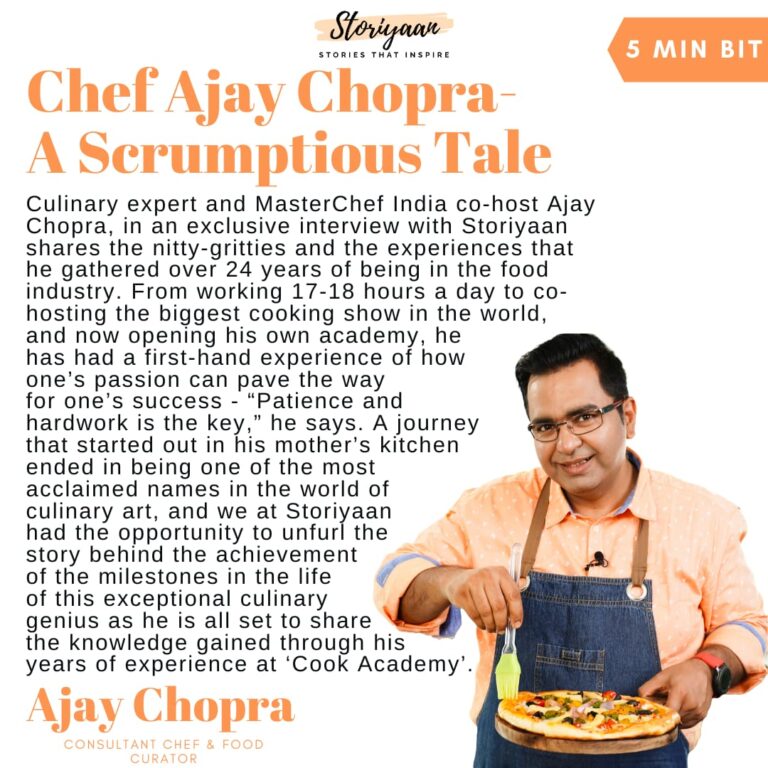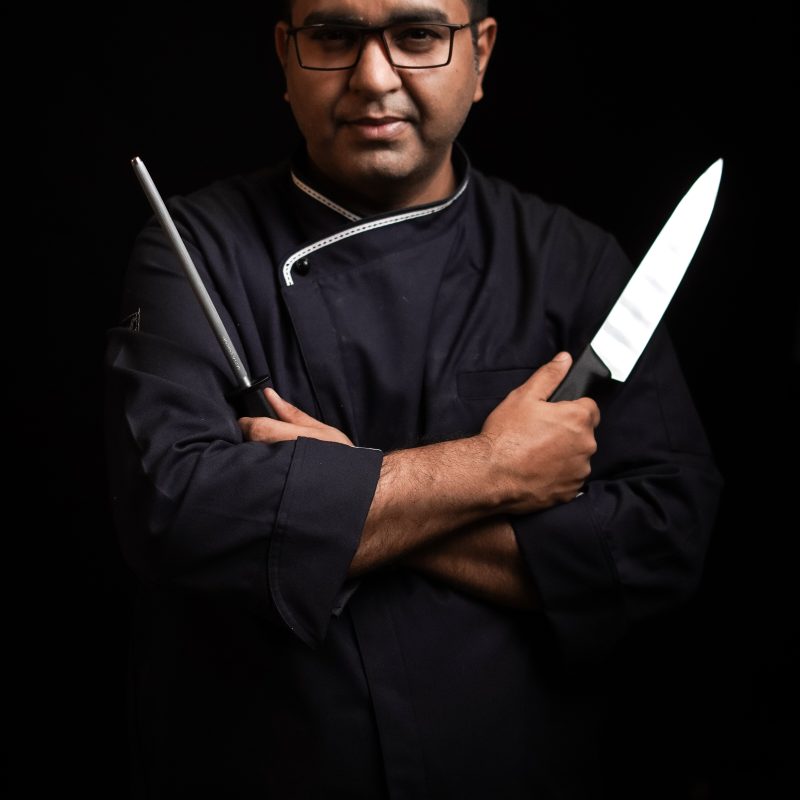Culinary expert and MasterChef India co-host Ajay Chopra , in an exclusive interview with Storiyaan, shares the nitty-gritty and the experiences that he gathered over 24 years of being in the food industry. From working 17-18 hours a day to co-hosting the biggest cooking show in the world, and now opening his own academy, he has had a first-hand experience of how one’s passion can pave the way for one’s success – “Patience and hard work is the key,” he says. A journey that started out in his mother’s kitchen ended in being one of the most acclaimed names in the world of culinary art, and we at Storiyaan had the opportunity to unfurl the story behind the achievement of the milestones in the life of this exceptional culinary genius as he is all set to share the knowledge gained through his years of experience at ‘Cook Academy’.

Interview
Questions and answers
When did you first stumble upon the revelation that being a chef was your calling and how big a role did your Punjabi lineage play in this choice?
The first revelation came during my hotel management course. Around 150 people were pushed inside the kitchen when we were in our first year and given loads of chicken to peel. After about half an hour. When I looked up, I saw only 3 people in the kitchen; everyone else had vanished and all those 3 people are chefs today. That day I realized that this is where I want to be and this is where I need to be. Being a Punjabi helped me to be more exploratory and my love for cuisine helped me to grow more.
Your passion made you develop a keen eye for all that was cooked around you and you would rush home to replicate them. How did you make up for the lack of professional or traditional instruments that were used for achieving this task and who did you turn to for assistance?
It was during the 1988-the 90s when there was no google to search what can be done. There were not a lot of tools at home and I had to manage with whatever was available. Trying to manage a firm desire was difficult but I didn’t bow. Whatever I would see cooking, I would come back home and try to replicate it: for example, whenever I would go to a takeaway shop of Chinese food and see them chopping the cabbage, I would also return home and try to chop the cabbage in the same way. I would cut my fingers, and there will be incessant bleeding. I wouldn’t give up and continued learning. Small cuts and burns didn’t let me down or stop me.
Despite your impeccable talent in the kitchen, the options posed before you after your board exams were Engineering or MBBS. A lot of students suffer from a similar dilemma where their true talents are overshadowed by parental and societal pressure and most succumb to it. What, in your opinion, can bring about a change in this stagnant attitude?
At that time there weren’t many options before me. Parents wanted their children to be engineers or doctors and that is why I was also being pushed to become one of them. Even today, a lot of students suffer from the same dilemma and their true talents remain unexplored. In my case, I was blessed with a supportive father who encouraged me to do what I wanted to do and could do best. You have to have a vision, clarity about your passion, and be willing to work hard enough that none can stop you.
What was the reaction of your friends and family when you broke the news of pursuing a career as a chef to them and who turned out to be your greatest motivator when you embarked upon this journey apart from your father?
I can say with confidence that everybody about that time was quite bully-ish about it. They would laugh at me and say things like “roti banayega”, “halwai”, “bawarchi banega”, “we have a new halwai in our house” and taunt me. I would listen to all those things from one ear and take them out from another. I had realized that a lot of people saying such things didn’t know the industry at all. When I went to the hotel management college, I realized that there was a whole new world to be explored and a lot of people don’t even know about it. So if people who are ignorant about it are laughing, then let them laugh; that is what I decided.
You had been working at Goa Marriott Resort and Spa for a year when the offer to co-host MasterChef came to you. Can you tell us a bit about the day and what was the biggest factor that won your approval to accept the offer?
I was sitting in my office when I received a phone call. One of my colleagues wrote the name of some media house and a number on a dirty piece of paper. My PR informed me that MasterChef was coming to India and they wanted me as a judge and that was a call for auditions. We had no idea what we were getting into, or how big this was but as we moved forward we realized that we were the judges of the biggest cooking show in the world that was going to shake the way our country looked at food. MasterChef India onwards I started to understand regional and other different kinds of food.
You mentioned that the platform you work on is completely built on the bricks of learning experiences you encountered in hotels, however, being a public figure now helps you innovate and explore the new avenues of life, which traditionally were constrained while working in hotels. Could you elaborate a bit on that?
Knowledge of cuisines is a mixture of building blocks but the foundation is important. The first level is understanding different spices and ingredients, the second blending them into new dishes and the third is using your experiences more creatively. Expanding my horizons has helped me to look at this whole culinary aspect differently and more extensively.
Being a travel enthusiast, how big a fan are you of local cuisines, and has there been a time when you have drawn inspiration from them and incorporated them into dishes of your own?
I am a travel enthusiast and a big fan of local cuisines that is where my inspiration has come from. The more I travel, the more I see and I understand that one lifetime isn’t enough for exploring the cuisines of India. India, being an amalgamation of 28 states and union territories, is not a country with just one cuisine. If we talk about Maharashtra, there are 4 regions and 4 cooking styles and if you look at Karnataka there are 3 different cooking styles. The more you travel the more you explore and the more you are amazed by what the country has and the local dishes which made a deep indulgence into the specialties and which inspired me to pass it on to millennials and GenZ through the platform we are building which is Cookacademy.

